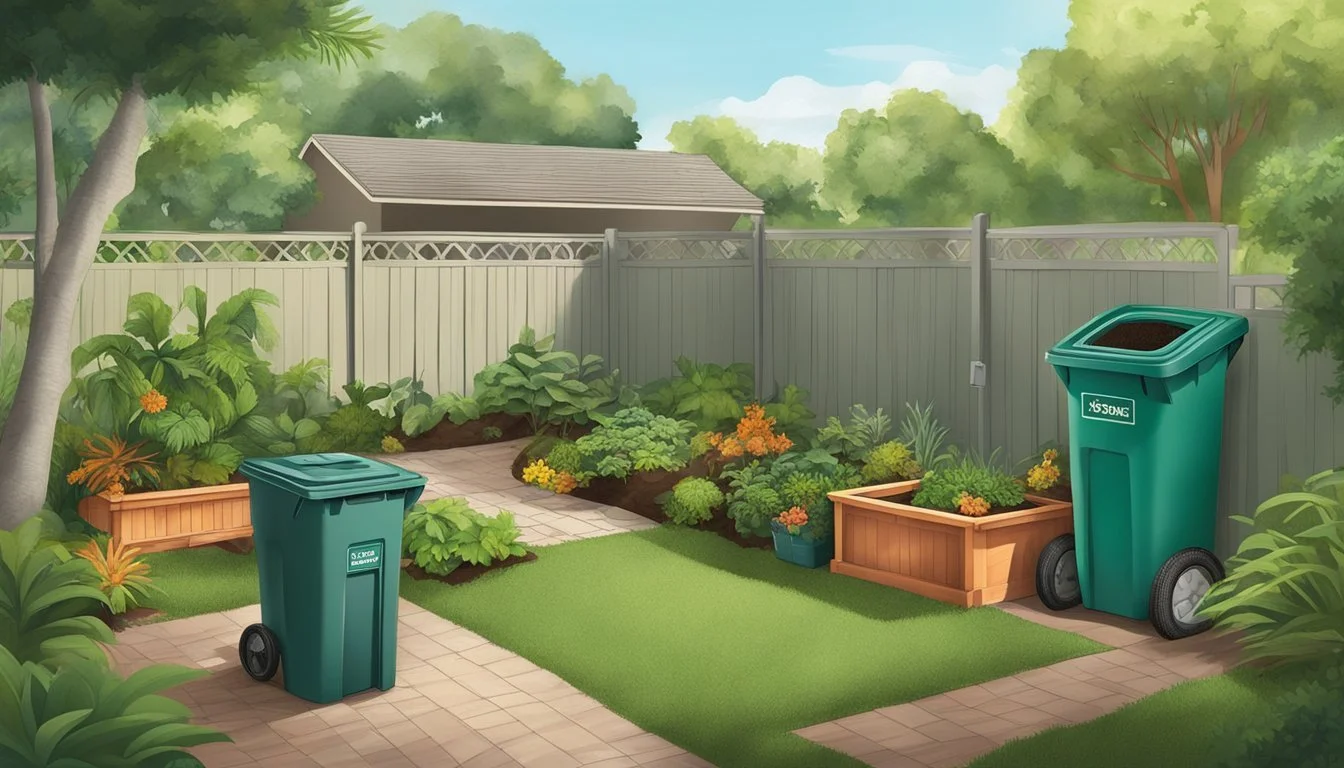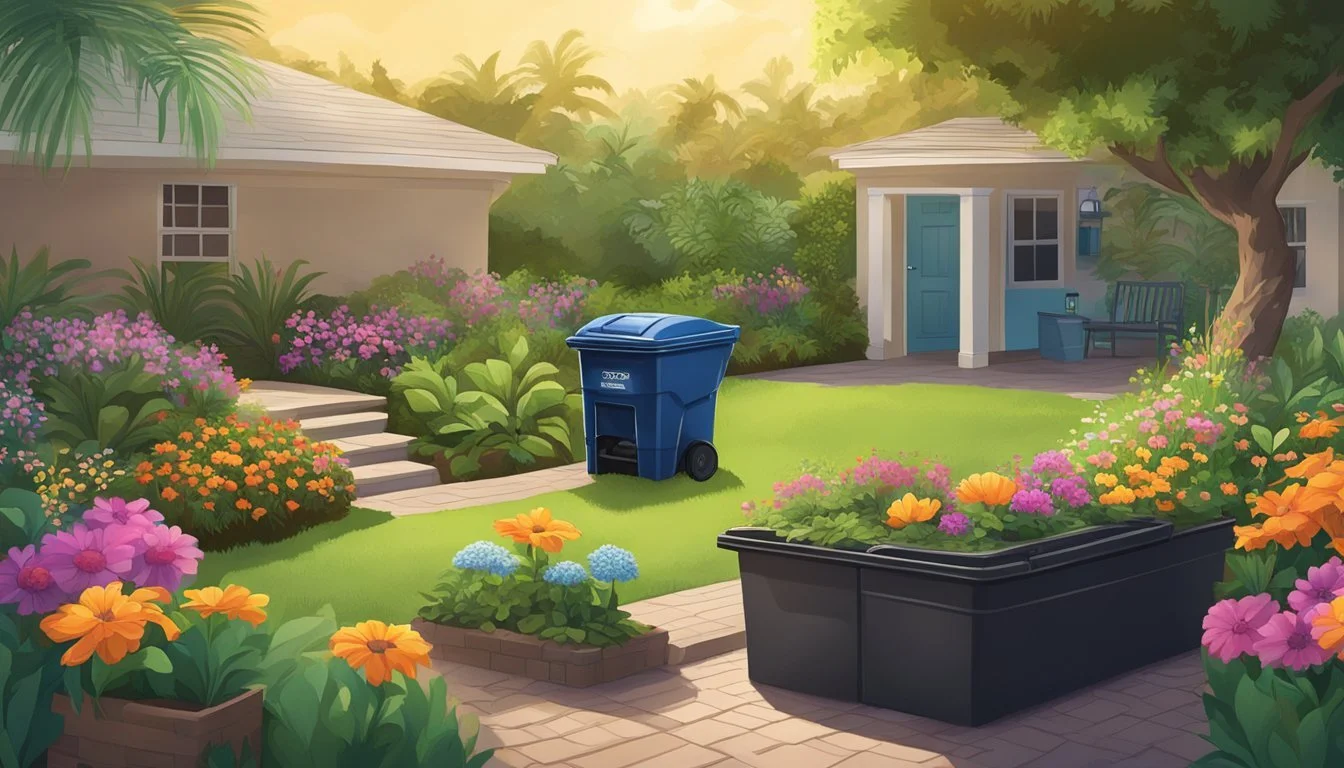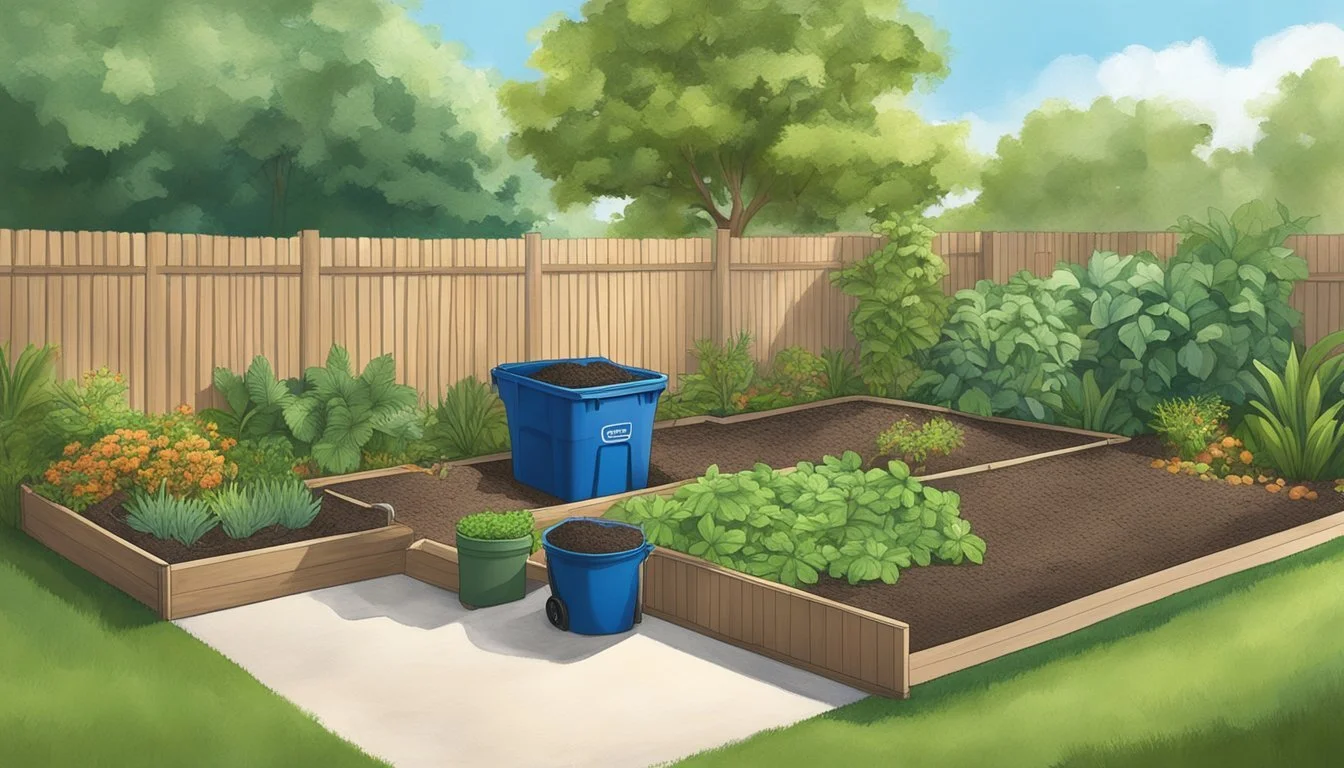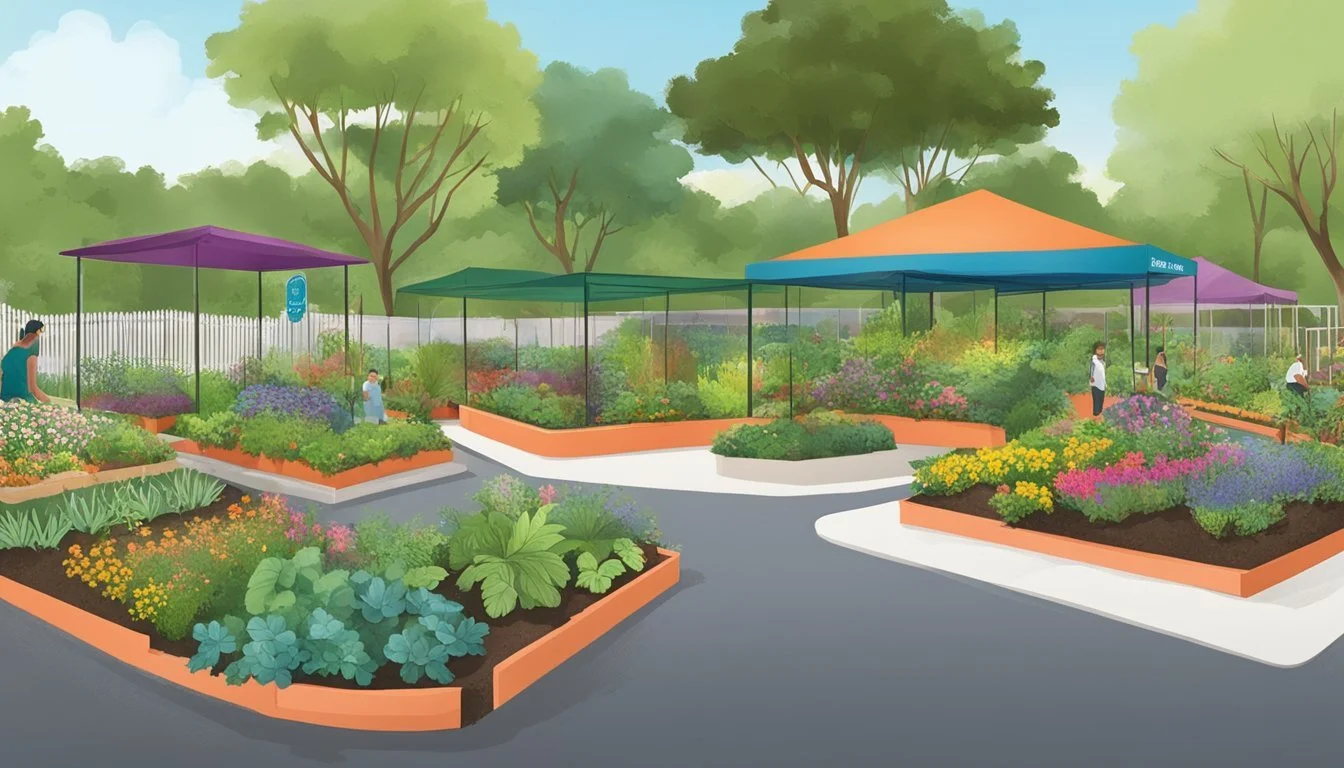Guide to Composting in Coral Springs, FL
Essential Tips for Beginners
Composting in Coral Springs, Florida, reflects the city's commitment to sustainability and environmental stewardship. Home to a proactive community, Coral Springs has implemented a range of composting services to manage resources efficiently and to minimize the environmental impact. The city encourages residents to participate in composting by offering free drop-off services and providing information on how to compost at home. Whether it's kitchen scraps like fruit and vegetable waste, or yard debris like leaves and twigs, residents have convenient options to divert organic waste from landfills.
The Waste Transfer Station in Coral Springs, open every Saturday morning, plays a pivotal role in the city's composting initiative. It is here that the community can bring their compostables. Additionally, composting and recycling are incorporated as key practices during all major city events to ensure the promotion of a zero-waste philosophy. This approach not only reduces the amount of waste sent to landfills but also converts organic matter into valuable compost that can enrich soil and support local gardens and green spaces.
Coral Springs provides clear guidelines on how to participate in composting efforts as well as education on its benefits. Proper composting reduces methane emissions from landfills, lowers one's carbon footprint, and leads to the production of a nutrient-rich soil additive. The city's solid waste management policies illustrate a comprehensive strategy that makes composting accessible and simple for its residents, ultimately contributing to a healthier, more sustainable environment.
Why Compost in Coral Springs?
Embracing composting in Coral Springs offers both environmental benefits and a way to significantly reduce landfill waste. By composting, residents and the city alike partake in a greener future and a more sustainable management of organic material.
Benefits for the Environment
Composting is key to improving the overall health of the environment in Coral Springs. It enriches the soil, helping to retain moisture and suppress plant diseases and pests. More importantly, it reduces the need for chemical fertilizers. Composting actively engages in closing the natural loop, returning nutrients to the soil rather than allowing them to degrade in air-polluting landfills. The City of Coral Springs recognizes the value of composting by offering services that encourage these environmental benefits.
Reducing Landfill Waste
The City of Coral Springs is actively working to reduce landfill waste by diverting organic material away from landfills. By recycling food scraps and yard waste through composting, the city effectively lowers methane emissions and decreases its carbon footprint. This initiative not only aids in managing landfill space more efficiently but also supports the city's commitment to sustainability.
Understanding Composting Basics
In Coral Springs, FL, composting involves efficiently transforming organic materials into nourishing soil additives through a controlled, natural process.
What Is Composting?
Composting is the strategic layering and maintaining of various organic materials to promote their breakdown into humus. It requires a balance of carbon-rich materials ("browns") such as leaves, twigs, and paper, with nitrogen-rich materials ("greens") like fruit and vegetable scraps. The City of Coral Springs supports composting by providing services for organic waste diversion, emphasizing its environmental and communal benefits.
How Decomposition Works
The decomposition process is a synergy of moisture, oxygen, and heat, which together accelerate the breakdown of organic matter. Microorganisms play a critical role, decomposing waste as they seek nutrients, while adequate moisture and oxygen supply are essential for their survival. Heat, a byproduct of microbial activity, further speeds up decomposition, leading to a successful composting outcome.
Setting Up Your Compost System
Establishing a compost system in Coral Springs, FL, involves two critical steps: finding the ideal location and choosing the right compost bin. A properly set up system not only aids in sustainable waste management but also provides nutrient-rich soil for gardening.
Choosing the Right Location
One should select a space for their compost system that is convenient yet considerate of surrounding activities. In Coral Springs, residents may designate a spot in their yard that is easily accessible, has good drainage, and is somewhat shaded to avoid direct sunlight overheating the compost. The location should be flat and clear of any waterlogged areas to encourage proper decomposition and prevent any unwanted odors from affecting living spaces or neighbors.
Selecting a Compost Bin
A compost bin is essential for managing yard waste and maintaining tidiness. In Coral Springs, individuals can use a variety of bins, but the most suitable choice should have a lid to deter animals and minimize rainwater intrusion, which can disrupt the compost balance. Bins can range from simple pallet structures to more sophisticated, aerated models. Residents can even participate in composting by bringing their organic materials to the Waste Transfer Station on specified days. The bin should be proportionate to the amount of compostable material produced; larger gardens warrant larger bins to accommodate the greater volume of yard waste.
What to Compost
In Coral Springs, composting can significantly reduce landfill waste through proper disposal of organic materials. The right balance of "green" and "brown" materials is crucial for successful composting.
Green Materials
"Green" materials are rich in nitrogen, which is a critical component in the composting process. They help to heat up the compost pile and speed up decomposition. Here are specific types of green materials suitable for composting:
Food Waste: This includes fruits and vegetables scraps, such as apple cores, banana peels, and carrot tops. Meat, dairy, and oily foods should be excluded to avoid pests and odors.
Coffee Grounds & Tea Bags: After brewing, coffee grounds add nitrogen, while tea bags contribute both nutrients and structure, as long as they are not made with synthetic fibers.
Brown Materials
"Brown" materials provide carbon, which fuels the organisms that break down the compost pile. Here are items of brown materials to include:
Yard Waste: Dried leaves, small branches, and twigs can be added. However, it is important to avoid diseased plants or those treated with chemicals.
Newspaper & Cardboard: Shredded newspaper and cardboard are excellent for balancing out the moisture of a compost pile, but they should be used sparingly and without colored inks or waxes.
Items to Exclude from Compost
When composting in Coral Springs, it is crucial to understand that not all waste is beneficial for your compost pile. Some items can attract pests, cause odors, and even contaminate your compost with harmful pathogens or chemicals.
Non-Compostable Organic Material
Meat, fish, dairy, and bones should be kept out of a compost pile. These items can:
Attract rodents and pests.
Lead to unpleasant odors as they decompose.
Pose a risk of pathogen development that can be harmful to humans and plants.
Fats and grease also fall into the non-compostable category for similar reasons. They can create a barrier around other compost materials, which reduces aeration and slows down the composting process.
Harmful Non-Organic Waste
Composting should be limited to organic waste; however, there are certain non-organic materials that one might mistakenly consider compostable. These include:
Pet waste: Can introduce parasites and pathogens.
Plastics: Do not break down and can release toxins as they degrade over time.
Metals and glass: These materials do not decompose and can create a hazard in the compost.
It's important for residents to adhere to these guidelines to maintain a healthy and efficient composting system. For a detailed list of compostable items, one could refer to the What Can Be Composted guideline.
Maintaining Your Compost
Proper maintenance is crucial for a successful composting process, as it involves the right balance of materials and the control of environmental conditions. The compost should be tended regularly to ensure the organic material breaks down efficiently and odor-free.
Balancing Green and Brown Materials
Green materials, which provide nitrogen, are essential for the microorganisms in the compost pile to thrive. Examples include vegetable scraps, fruit waste, and grass clippings. On the other hand, brown materials supply carbon, necessary for energy; these include items like dry leaves, sawdust, and shredded paper. An ideal compost pile should have a balanced ratio of green to brown materials, usually around 1 part green to 3 parts brown by volume.
Managing Moisture and Aeration
Compost requires adequate moisture to support the breakdown of organic matter. The pile should be as wet as a wrung-out sponge. If the compost is too dry, essential microorganisms cannot survive, and if it's too wet, it might lead to odor problems and a slower decomposition process.
Aeration is also critical, as air circulation provides the oxygen required by microorganisms. Turning the compost periodically introduces air and distributes moisture and heat evenly throughout the pile. This can be done using a pitchfork or a compost-turning tool. Adequate aeration prevents the pile from becoming anaerobic, which can slow down the composting process and cause unpleasant odors.
Utilizing Finished Compost
Finished compost is a nutrient-rich, soil-like material that enhances the growth of plants in a garden and can be beneficial to the wider community. It is the end result of the composting process and provides numerous benefits when used appropriately.
In Your Garden
When using compost in a home garden, one can mix it into the soil prior to planting or use it as a top dressing for established plants. This natural amendment improves soil structure, increases moisture retention, and provides essential nutrients for healthy plant growth. The recommended application is a 2-3 inch layer of compost mixed into the top 6 inches of soil. This practice encourages a thriving ecosystem within the garden, promoting better root development and plant health.
Improves Soil Structure: Compost introduces organic matter into the soil, helping to loosen compacted earth, which allows for better root expansion and water infiltration.
Boosts Nutrient Content: A blend of decomposed organic matter, compost is rich in essential nutrients like nitrogen, phosphorus, and potassium, which are fundamental for plant growth.
Enhances Microbial Activity: The introduction of compost into the garden soil stimulates the activity of beneficial microorganisms that support plant nutrition and help suppress soil-borne diseases.
Around the Community
Communities often benefit from the use of compost in public spaces such as parks, gardens, and landscaping projects. The City of Coral Springs, through its Compost Coral Springs program, enables residents to participate in and utilize composting efforts, improving green spaces for all.
Park Maintenance: Applying compost to public park areas can greatly enhance the vitality of grass and ornamental plants, leading to lush and more resilient landscapes.
Community Gardens: In locations with community gardens, compost serves to enrich shared plots, fostering a sense of pride and cohesiveness among participating gardeners.
By incorporating finished compost both in personal home gardens and community projects, residents of Coral Springs contribute to the sustainability and beautification of their environment.
Community Involvement and Education
In Coral Springs, FL, the community plays a pivotal role in the successful implementation of sustainable waste management practices, particularly composting and recycling. Through initiatives by the City of Coral Springs and various educational programs, residents are encouraged to actively participate and expand their knowledge on the importance of composting.
City Composting Initiatives
The Compost Coral Springs program is an ambitious move towards resource sustainability, championed by the city to reduce waste and divert organic material from landfills. At city-led events, recycling and composting stations are readily available under the Public Works tent for the proper disposal of food waste, bottles, and cans. Residents have access to free drop-off composting services at the Waste Transfer Station, located at 12600 Wiles Road, ensuring convenience and encouraging community participation.
Composting Education Programs
Compost Coral Springs program complements its initiatives with education to empower residents with the knowledge they need to recycle right. The city hosts workshops and provides online resources aimed at educating people on the benefits and methods of composting. These efforts are geared towards instilling responsible waste management practices and ensuring the program's long-term success through informed community actions.
Troubleshooting Common Issues
When composting in Coral Springs, FL, it's essential to address common issues such as odors and pests effectively. This ensures a healthy composting process and a pleasant experience.
Odor Control
The presence of a bad odor is often a signal that the compost pile is not balanced. A well-maintained compost should have a pleasant, earthy smell. If not, check for excessive moisture and lack of airflow. To manage odors:
Lid: Ensure the compost bin lid is fitting properly. A lid can help control moisture levels and reduce smells, but remember to leave some gaps for air.
Balance: Adjust the green to brown ratio. Make sure there's enough dry, carbon-rich materials to absorb excess moisture.
Turn: Regularly turn the compost to aerate it, as this can greatly help in minimizing unpleasant odors.
Pest Prevention
Pests are attracted to food scraps and can be a nuisance if the compost is not managed properly. To keep pests at bay:
Location: Place the compost bin in a spot that’s less accessible to pests yet convenient for adding waste and turning.
Container: Use a container designed to keep pests out. It should be robust and have a secure lid but with ventilation.
Cleanliness: Maintain cleanliness around the compost area to avoid attracting pests with spillage or scattered organic matter.
Local Resources and Support
Coral Springs provides robust options for residents looking to contribute to composting efforts. The city offers designated locations for compost drop-off and provides educational workshops to ensure everyone is well-informed about the composting process.
Compost Drop-Off Locations
The City of Coral Springs has initiated the Compost Coral Springs program, where residents can take their organic waste to specified drop-off points. This effort aids in diverting waste from landfills, extending their lifespan, and reducing methane emissions. The waste transfer station is equipped to handle the city's compostable materials.
Locations for Drop-off:
Residents can look for the Public Works tent at major city events to dispose of organics.
For daily composting, residents are encouraged to use designated bins dispersed throughout the city.
Workshops and Guidance
Education plays a crucial role in the success of composting programs. The city frequently organizes workshops to guide residents on best practices.
Schedule of Events:
Interested parties can check the city's website or community bulletin boards for upcoming workshops.
These events provide Coral Springs residents with the knowledge to effectively separate and manage their compostable waste.
Through these resources and proper guidance, composting in Coral Springs is accessible and convenient for every resident committed to sustainability.











